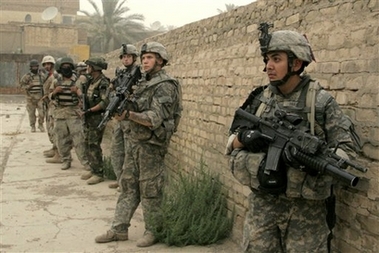Bush not considering Iraq troop pullout
(AP)Updated: 2007-07-10 05:32

U.S. and Iraqi soldiers stand on a street during a pre-dawn raid that netted nine suspected al-Qaida members in Baqouba, 60 kilometers (35 miles) northeast of Baghdad, Iraq, Monday, July 9, 2007. [AP]
|
The administration also tried to lower expectations about a report due Sunday on whether the Iraqi government is meeting political, economic and security benchmarks that Bush set in January when he announced a buildup of 21,500 U.S. combat forces. White House press secretary Tony Snow said that all of the additional troops had just gotten in place and it would be unrealistic to expect major progress now.
"You are not going to expect all the benchmarks to be met at the beginning of something," Snow said. "I'm not sure everyone's going to get an `A' on the first report."
But at the same time, he said that Sept. 15 is not "the drop dead date" by which everything should be completed.
Senate Majority Leader Harry Reid told reporters Monday that Democrats won't wait for the reports and will move forward with anti-war legislation. By week's end, the Senate will vote on a proposal by Sens. Jim Webb, D-Va., and Chuck Hagel, R-Neb., that would require that troops spend as much time at home as they do in combat. Another proposal, by Sen. Carl Levin, D-Mich., would order troop withdrawals in 120 days.
"The surge (in troops) was supposed to provide Iraq political leaders the space to make the compromises necessary to unite this nation. It hasn't happened, despite the bravery of our troops," said Reid, D-Nev.
Defense Secretary Robert Gates shortened a planned trip this week so he would be in Washington to attend policy meetings aimed at coming up with the report to Congress.
In Florida for a military ceremony, Gates participated in a video conference Monday morning with the president's national security team, said Defense Department spokesman Bryan Whitman. He was to have continued on to Latin America, but changed his plans so he could return to Washington Monday afternoon.
Asked if Pentagon officials were studying a change in Iraq strategy, Whitman would say only that the military is "focused on implementing" the current strategy.
The boost in troop levels in Iraq has increased the cost of war there and in Afghanistan to $12 billion a month, with the tally for Iraq alone nearing a half-trillion dollars, according to the nonpartisan Congressional Research Service, which provides research and analysis to lawmakers.
The figures call into question the Pentagon's estimate that the increase in troop strength and intensifying pace of operations in Baghdad and Anbar province would cost only $5.6 billion through the end of September.
Bush is under growing pressure even within his own party to shift course in Iraq as the war drags on and casualties climb. At least 3,605 members of the U.S. military have died since the war began in March 2003. Bush's approval rating in the polls has sunk to record lows.
Sen. Susan Collins of Maine, ranking Republican on the Homeland Security Committee, said there had been "a steady erosion for the president's policy" in Congress because of the "tremendous loss of life among our troops" in June and "the failure of the Iraqi government to pursue the political reforms that are necessary to quell the sectarian violence."
Earlier this year Bush vetoed legislation that would have set a deadline for U.S. troop withdrawals. In recent days three Republicans ¡ª Sens. Richard Lugar of Indiana, George Voinovich of Ohio and Pete Domenici of New Mexico ¡ª have announced they can no longer support Bush's Iraq strategy and have called on the president to start reducing the military's role there.
Several Republicans, including Collins and Domenici, have signed on to legislation that would call on Bush to adopt the findings of the Iraq Study Group. The bipartisan independent panel recommended the U.S. take certain diplomatic steps to pave the way for a redeployment of troops by spring 2008.
Reid indicated he wasn't interested in calling for a vote on the measure unless it forces a change in strategy.
"What we do has to be more than something that feels good," Reid said. "It has to be something that calls for real change in our policy in Iraq. It's something that is far overdue."
But Snow said any debate happening right now among Bush and his aides is a continuation of discussions they have always had about the goal the president set from the beginning: bring troops home eventually, but only based on improvement "on the ground, not on politics."
"There is no intensifying discussion about reducing troops," he said. "We are continued to be committed to letting the surge work."
Snow said that neither the upcoming report required by Congress or the eroding support among Republicans ¡ª which he denied is happening ¡ª was prompting any change at the White House.
"There will be no red squares on the calendar at the end of the week," he said.
|
|
|
||
|
||
|
|
